- Home
- Graham McNeill
Priests of Mars Page 24
Priests of Mars Read online
Page 24
Vintras circled the cogitators to stand before him, and Koskinen wished he hadn’t spoken. To be a moderati aboard a Warlord Titan was a position of great honour, but any princeps – even a Warhound princeps – outranked him and had the power to end his life.
‘What’s this, a moderati getting above his station?’ said Vintras, leaning over Koskinen and baring teeth filed to sharpened fangs. ‘Careful, little man, before this big bad wolf tears out your throat.’
+Leave the boy alone, Vintras,+ said a sharp-toothed voice from the augmitter mounted on Skálmöld’s casket. +He sees that you come to a pack-meet dressed for a funeral.+
‘Apologies, Moonsorrow,’ said Vintras, backing off with a feral grin. ‘I await your word.’
‘Right, we’re all here now, Skálmöld,’ grunted Härkin, his exoskeleton wheezing and clicking as he resumed his pacing. ‘What is it you want from us?’
+You know what I want. Command. Luth is a spent force. His time is over. Mine is upon the Legio. You all know this.+
No one answered the Moonsorrow. Koskinen and Hyrdrith had expected this, but to hear it said out loud, so boldly before the rest of the Legio, was still a shock. Looking around the medicae-templum, Koskinen realised that no one wanted Skálmöld in command. The pack dynamic was a reflection of the alpha, and Skálmöld’s cold heart would eventually come to dominate the engines under his command and turn them from co-operative hunters to vicious predators. Härkin looked appalled at Skálmöld’s presumption, and even Vintras looked uneasy at this development, though he must surely have seen it coming.
‘Princeps Luth has yet to wake,’ said Härkin.
+And when he does, can anyone here say he will not dream of old wars and turn his guns on a pack brother once more?+
Koskinen wanted to speak in Luth’s defence, but the Magos Biologis had found no cause for his waking nightmare and could offer no guarantees that such a psychotic break would not happen again. Skálmöld spoke nothing but the truth, but it still rankled Koskinen’s sense of justice that the Reaver princeps was wresting pack leadership while the alpha could not defend his position.
‘Command authority has to be granted by the Oldbloods,’ said Princeps Härkin, in a last-ditch attempt to invoke Legio protocol.
+The Oldbloods are not here. We are. I am. The Wintersun turned his guns on a brother warrior. There is no greater crime against the pack. Why do you even argue, Ironwoad? I am the Moonsorrow and you are not my equal.+
Härkin bowed in a clatter of exo-joints. ‘You are senior pack, Moonsorrow.’
+Then the matter is done with,+ said Skálmöld. +I am Alpha Princeps.+
+No.+
Koskinen jumped at the sound issuing from the casket beside him. Princeps Arlo Luth floated to the glass, his bulbous, elongated skull still raw from the numerous invasive surgeries he had recently undergone. The cables that connected him to the Manifold were absent, and the threaded sockets in his chest and spine gaped like steel-edged wounds. Green lights flickered at the front of the casket, and Koskinen saw Hyrdrith withdraw a surreptitious data-plug.
+I am the Wintersun, and you are not my equal.+
The Valette Manifold station hung in the darkness of the system’s edge like a patient arachnid waiting for unwary prey to become trapped in its web. Its bulbous central section was dark and glossy with ice, and numerous slender limbs extended from its gently rotating central hub; manipulator arms, auspex, surveyor equipment, monitoring augurs and psi-conduits. Though still hundreds of thousands of kilometres away, the Speranza’s prow-mounted pict-feeds brought its image into perfect focus.
A reverent hush held sway on the Speranza’s command deck. As the last place to have received word from Magos Telok, the Valette Manifold station was a holy place and memorial all in one. None of the gathered magi failed to recognise the significance in coming here before attempting to breach the Halo Scar.
Magos Azuramagelli maintained their course and monitored the gradual increase in engine power as work continued to repair the damaged plasma combustion chamber. The loss of so many of Saiixek’s bondsmen had proved inconvenient, but with the addition of numerous work gangs of servitors from the drained refinery vessels, the expected dip in productivity and efficiency was proving to be less than the magos of engineering had feared. At the farthest edge of the deck, Linya Tychon and her father worked at an astrogation hub, manipulating a pair of four-dimensional maps.
Magos Blaylock kept station beside the command throne, processing the ship’s inputs and allowing Kotov to maintain communion with the Speranza. The Ark Mechanicus was still skittish after the incident with the Titans, and required a light touch to keep its systems appeased. Much of Kotov’s cognitive power was directed in healing the spiritual wounds done to the starship and regaining its unequivocal trust. Much of the situational knowledge stream he would process at a subconscious level, he was forced to delegate to his subordinates and learn second-hand.
‘Any response to our binary hails yet?’ asked Kotov.
‘No, archmagos,’ replied Blaylock, sifting through the accumulated data inloading from their scans of the darkened station. ‘We continue to be rebuffed.’
‘And its Manifold still won’t accept communion?’
‘It will not,’ agreed Blaylock. ‘It is most perplexing.’
Kotov took a moment to study the distant station, its mass a deeper dark against the prismatic stain of the Halo Scar beyond the corona of the system sun’s light. He had studied the anomaly at the edge of the galaxy extensively, but to actually see it for the first time gave him a strange frisson of excitement and fear.
Emotions Kotov had thought long since consigned to his organic past.
The Tychons were collecting reams of data on the ugly phenomenon to better gauge a path through the gravitational tempests raging within its nebulous boundary. Their work was highly detailed, but the thousands of years of accumulated immatereology statistics within the Manifold station would greatly aid their cartographic equations. So far they had received nothing but static in response to their repeated attempts to persuade the station to exload its data to the Speranza.
Yet as fascinating as the Halo Scar’s deformation of space-time was, Kotov kept finding his gaze drawn back to the Manifold station. Six hundred metres wide at its central bulge, and three hundred metres high, the station was a mote in the galactic wilderness, almost invisible in the darkness. Only faint starlight glinting from the ice on its hull provided an outline. Glittering drifts of reflective chips hung around the station like frozen snowflakes, but the source of these tiny pieces of orbital debris was a mystery.
And Kotov abhorred mysteries to which he knew he would find no answer.
Ghostly and dead, the station held true to its ancient orbit, a prisoner of gravity and physics.
Kotov’s myriad senses, more than any unaugmented mortal could hope to understand or employ, were alert for any sign that there was anything or anyone alive on the Valette station. So far they had not given him any hope that he would find any of the designated crew alive aboard the station.
Yet for all that, Kotov was certain that there was something on that station that was looking back at them, watching them, studying them...
‘Time to intercept?’ he said, throwing off the ridiculously organic notion of being observed.
‘Three hours, fifteen minutes, archmagos,’ replied Azuramagelli, shifting his exo-body across the bridge to a second astrogation hub. Spindle-like manipulator arms extruded from the underside of his exo-armature body and drew out a physical keyboard.
‘A problem, Azuramagelli?’
Two of Azuramagelli’s brain jars swivelled in their mounts as he answered.
‘Unknown,’ replied Azuramagelli. ‘Ever since we dropped out of the warp, the rear auspexes have been picking up an intermittent contact. Nothing I can fix upon, but it is curious.’
‘What do you believe it to be? Another ship?’
‘Most likely it is residual warp i
nterference or a side-effect of our recent troubles,’ said Azuramagelli, his manipulator arms fine-tuning the hazy auspex image before him. ‘But, yes,I suppose it could be a ship.’
‘Might it be the Honour Blade?’
‘I do not believe so, though the presence of the Halo Scar on the far edge of the system is making accurate readings difficult. Perhaps with access to the primary astrogation hub I might obtain a clearer answer for you, archmagos.’
Kotov ignored the jibe at the Tychons and said, ‘Keep watch on your ghost readings and inform me of any developments.’
Azuramagelli’s brain jars turned away, and Kotov heard the armoured gate to the command deck slide down into the polished floor. He read the biometrics of Roboute Surcouf, and swivelled his command throne to face the rogue trader.
The man had answered Kotov’s summons in a loose Naval storm coat, grey in colour, with discolouration where rank patches had been torn off. Dark trousers were tucked into knee-high brown boots, and in deference to his hosts and skitarii escort, he had left his thigh holster empty. Surcouf strolled onto the upper tier and took a moment to look around, his gaze lingering a fraction of a second longer on Mistress Tychon than any other aspect of the command deck.
Elevated heart rate, pupillary dilation, increased hormonal response.
Surely the captain did not harbour amorous thoughts towards a member of the Cult Mechanicus? The idea was ludicrous.
Kotov dismissed the man’s foolishness and said, ‘Welcome to the command deck, captain. Thank you for attending upon me.’
‘Not a problem,’ said Surcouf. ‘I’ll admit, I was looking forward to seeing the bridge of this ship of yours. Pavelka and Sylkwood wanted to come with me, but they’re busy helping Magos Saiixek down in the engineering decks just now.’
‘And what do you make of my command deck?’ inquired Kotov. ‘It is quite something, is it not?’
‘I have to admit, it’s a little underwhelming,’ said Surcouf at last.
Kotov felt the rumble of the slighted ship within him, but quelled it as understanding dawned.
How easy it was to forget the limitations of mortals!
‘Of course,’ said Kotov. ‘You are not noospherically enabled.’
‘Not unless I’m plugged in.’
‘I took it for granted that you could see as I see.’
‘Never take anything for granted,’ said Surcouf. ‘That’s when you start making mistakes.’
Irritated at being lectured to by a lesser mortal, Kotov made a complex haptic gesture, and a contoured bucket seat emerged from an irising deck plate beside the rogue trader. Surcouf swept aside the tails of his long coat and sat down, unspooling a thin length of insulated cable from the concave headrest. Taking a moment to find the socket under his hair at the nape of his neck, Surcouf slotted home the connector rods and engaged the communion clamp. His body twitched with the system shock of sudden inload, but he relaxed with the quick ease of an experienced spacefarer.
‘Ah,’ he said. ‘Now I see. Yes, very impressive, archmagos.’
‘We are almost at the Halo Scar,’ said Kotov. ‘Are you still confident you can guide us on the other side?’
‘I have the data wafer with the astrogation data, don’t I?’
‘So you claim, but I have yet to see anything further on its veracity.’
‘Then you’ll just have to trust me,’ said Surcouf, nodding towards the main cascade display. ‘Is that the Manifold station?’
‘It is indeed,’ Kotov said.
‘And that’s the last place to have heard from Telok?’
‘I assumed you would already know such information.’
‘I’ve done my reading,’ said Surcouf. ‘I thought the Valette station was still functional.’
‘That is our current understanding.’
Surcouf shook his head. ‘That thing doesn’t look like it’s been functional in a long time.’
‘You are correct,’ said Kotov. ‘All emanations indicate that the facility has gone into hibernation.’
‘Do you know why?’
‘Not yet, but we will soon.’
‘It looks like a space hulk,’ said Surcouf, making the sign of the aquila across his chest.
‘Superstition, captain?’
‘Common sense.’
‘I assure you, there is nothing untoward aboard the Manifold station.’
‘How can you be sure?’
‘Our surveyors are picking up nothing to suggest any source of threat.’
Surcouf thought for a moment. ‘Did the station have a crew?’
‘No need for the past tense, captain,’ said Kotov. ‘The station is manned by a magos, five technomats, a troika of astropaths and a demi-cohort of servitors.’
‘When was the last time anyone came out here to check they were still alive?’
‘The last contact with the Valette station was eighty standard Terran years ago, when Magos Paracelsus was routed from forge world Graia to relieve Magos Haephaestus as part of the routine cycle of command. Paracelsus exloaded his docket of arrival as scheduled.’
‘I assume Haephaestus returned to Graia?’
Kotov hesitated before replying, once again checking the parity of information in his own repository with that of the Speranza.
‘Unknown,’ he said at last, loath to make such an admission. ‘Records concerning the magi subsequent to their postings to Valette are incomplete.’
‘Incomplete?’ said Surcouf. ‘You mean you don’t know what happened to any of them?’
‘In a galactic-wide arena of information it is not unknown for some data to be... lost in transit.’
‘Emil would love to hear you say that,’ said Surcouf with a wide grin. ‘So, you don’t know what happened to Haephaestus or the previous incumbents, and you don’t know what’s been happening since Paracelsus got here.’
‘I begin to tire of your constant questioning of our data, Captain Surcouf,’ said Kotov.
‘And I’m beginning to tire of you keeping things from me,’ retorted Surcouf. ‘If there’s a crew on that station, why aren’t they responding? If everything’s fine over there, why are you moving your escorts into an attack formation? You didn’t think I’d notice that? Please...’
‘Simply basic precautions, captain,’ said Kotov.
‘Let me give you a free piece of advice, archmagos,’ said Surcouf. ‘Never play Emil Nader at Knights and Knaves.’
‘Clarification: I do not understand the relevance of your last remark.’
‘Because you’re a lousy liar, Lexell Kotov,’ said Surcouf. ‘You know as well as I do that something’s not right with that station. Something is very much out of the ordinary, and you don’t know what it is, do you?’
‘The situation aboard the Manifold station is unknown at present,’ agreed Kotov. ‘But when I explore the station I am confident that logical answers will present themselves.’
‘You’re going to board that thing?’ said Surcouf.
‘I am an explorator,’ said Kotov. ‘It is what I do.’
‘Rather you than me.’
‘I assure you there is no danger.’
Surcouf looked back up at the screen, and the image of the patient arachnid returned to Kotov as the rogue trader made the sign of the aquila once again.
‘I’d take those Black Templars with you,’ said Surcouf. ‘Just in case you’re wrong.’
Despite the wholesale murder of thousands of bondsmen, very little changed in the routine of the men and women below decks. Fresh meat was skimmed from the other shifts, and the numbers in Abrehem, Hawke and Coyne’s shift group were bulked out by cybernetics. Scores of heavily-muscled servitors joined their ranks, silent and glassy eyed as they carried out their orders without complaint and without thoughts of dissent.
Rumours of what had happened in the lower decks spread around the various shifts like a dose of the pox, as did the miracle of their small group’s survival. Abrehem saw men and women looking at h
im strangely, and it took Hawke to point out to him that they were in awe of him. It had been his warning that had saved the four of them, and word had gone around that he was Machine-touched, a secret prophet of the Omnissiah who carried its blessing to the least of its servants.
Soon he began finding trinkets fashioned from scavenged junk, gifts of food or water and bac-sticks left by his bunk. At first he tried to refuse such offerings, but his every attempt to play down what he’d done in the reclamation chamber only seemed to enhance his reputation.
‘But I’m not Machine-touched,’ he complained to his companions one night as they sat in the crowded feeding hall and spooned yet more tasteless gruel into their soft-gummed mouths. Where before the only sounds in the giant chamber had been the slop of nutrient broth and the clatter of plastic spoons, now a low hubbub of reverent whispering bubbled just below the surface.
‘How do you know?’ asked Hawke. ‘Only the truly divine deny their divinity. Isn’t that what the Book of Thor says?’
Both Coyne and Abrehem gave Hawke a sidelong look. Even Crusha looked surprised.
‘I didn’t take you for a religious man, Hawke,’ said Abrehem.
Hawke shrugged. ‘I’m not normally one for prayers and the like, but it’s always good to know who I need to holler for when I’m in trouble. You know, just in case they’re listening. And I always liked the story of Sebastian Thor. He stood up to rich bully boys and started a landslide that toppled a High Lord. I got a soft spot for those kinds of stories.’
‘It’s more than a story,’ said Coyne. ‘It’s scripture. It’s got to be true.’
‘Why? Because you read it in a book or some fat preacher told it to you when you were a little boy? Even if it did really happen, it was so long ago that it might as well be made up. You know, I used to love hearing the stories in the templum about the Emperor’s armies conquering the galaxy and fighting their enemies with flaming boltguns and raw courage. I used to pretend I was a hero, and I’d run all over the scholam grounds with a wooden sword conquering it like I was Macharius or something.’
‘I’ve seen him,’ said Abrehem. ‘In the processional at the Founding Fields there’s a statue of Macharius and Lysander. No offence, Hawke, but you’re too damn ugly to be a warmaster.’

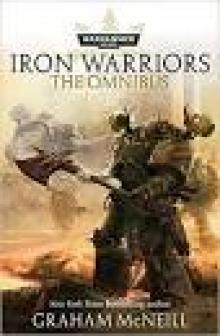 Iron Warriors - The Omnibus
Iron Warriors - The Omnibus Old Wounds, New Scars
Old Wounds, New Scars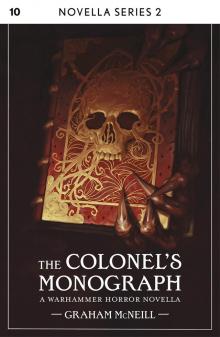 The Colonel's Monograph
The Colonel's Monograph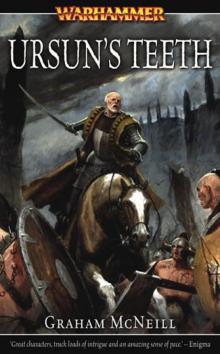 Ursuns Teeth
Ursuns Teeth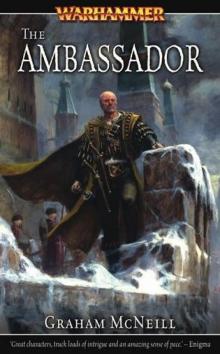 The Ambassador
The Ambassador![[Ultramarines 5] Courage and Honour - Graham McNeill Read online](http://i1.bookreadfree.com/i/03/12/[ultramarines_5]_courage_and_honour_-_graham_mcneill_preview.jpg) [Ultramarines 5] Courage and Honour - Graham McNeill
[Ultramarines 5] Courage and Honour - Graham McNeill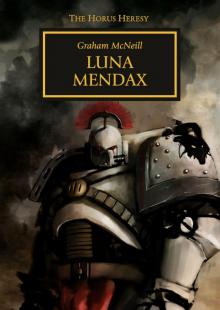 28a Luna Mendax
28a Luna Mendax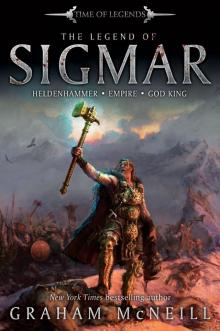 The Legend of Sigmar
The Legend of Sigmar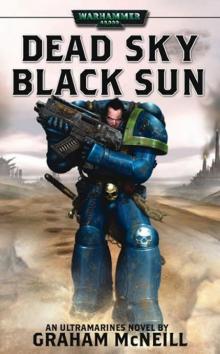 Warhammer - Ultramarines 03 - Dead Sky, Black Sun (McNeill, Graham)
Warhammer - Ultramarines 03 - Dead Sky, Black Sun (McNeill, Graham)![Warhammer - [The Ambassador Chronicles 01] - The Ambassador Read online](http://i1.bookreadfree.com/i/03/17/warhammer_-_[the_ambassador_chronicles_01]_-_the_ambassador_preview.jpg) Warhammer - [The Ambassador Chronicles 01] - The Ambassador
Warhammer - [The Ambassador Chronicles 01] - The Ambassador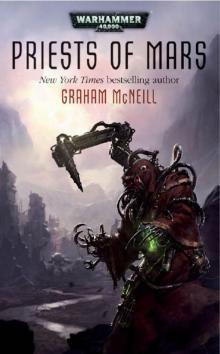 Priests of Mars
Priests of Mars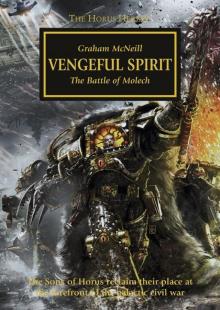 Vengeful Spirit
Vengeful Spirit![[Sigmar 03] - God King Read online](http://i1.bookreadfree.com/i/03/13/[sigmar_03]_-_god_king_preview.jpg) [Sigmar 03] - God King
[Sigmar 03] - God King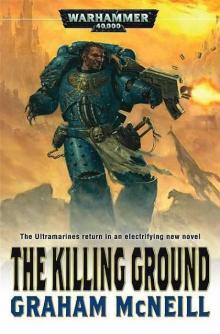 The Killing Ground
The Killing Ground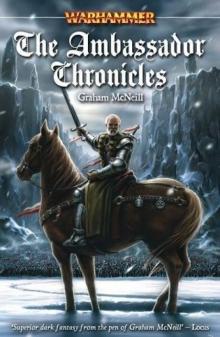 The Ambassador Chronicles
The Ambassador Chronicles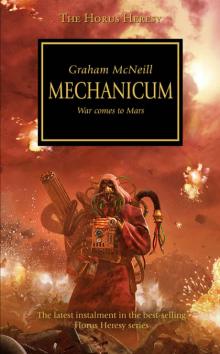 Mechanicum
Mechanicum![[Ulthuan 02] - Sons of Ellyrion Read online](http://i1.bookreadfree.com/i/03/14/[ulthuan_02]_-_sons_of_ellyrion_preview.jpg) [Ulthuan 02] - Sons of Ellyrion
[Ulthuan 02] - Sons of Ellyrion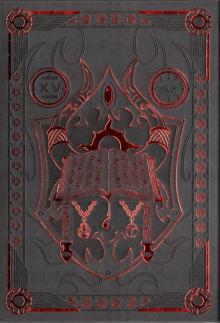 Magnus the Red: Master of Prospero
Magnus the Red: Master of Prospero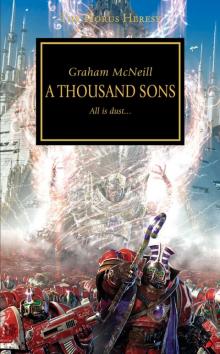 A Thousand Sons
A Thousand Sons![[Warhammer] - Guardians of the Forest Read online](http://i1.bookreadfree.com/i/03/18/[warhammer]_-_guardians_of_the_forest_preview.jpg) [Warhammer] - Guardians of the Forest
[Warhammer] - Guardians of the Forest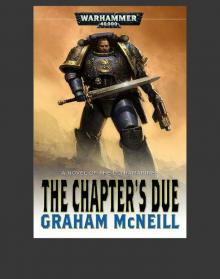 The Chapters Due
The Chapters Due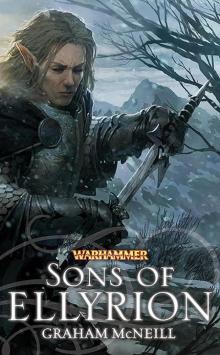 02 - Sons of Ellyrion
02 - Sons of Ellyrion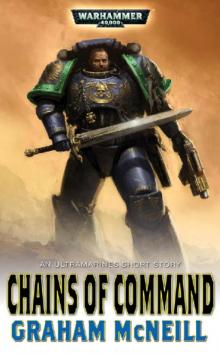 Chains Of Command
Chains Of Command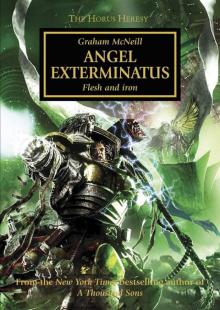 Angel Exterminatus
Angel Exterminatus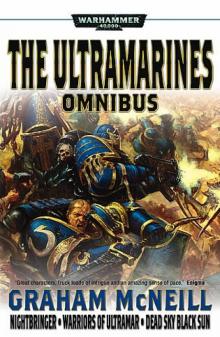 The Ultramarines Omnibus
The Ultramarines Omnibus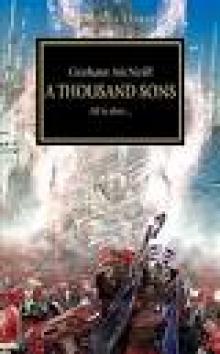 X Marks da Spot
X Marks da Spot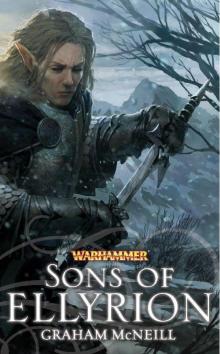 Sons of Ellyrion
Sons of Ellyrion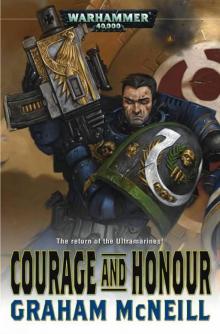 Courage And Honour
Courage And Honour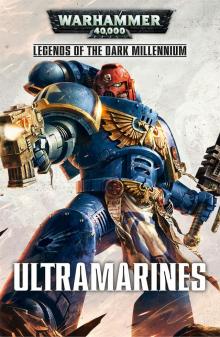 Ultramarines
Ultramarines![[Ulthuan 01] - Defenders of Ulthuan Read online](http://i1.bookreadfree.com/i/03/16/[ulthuan_01]_-_defenders_of_ulthuan_preview.jpg) [Ulthuan 01] - Defenders of Ulthuan
[Ulthuan 01] - Defenders of Ulthuan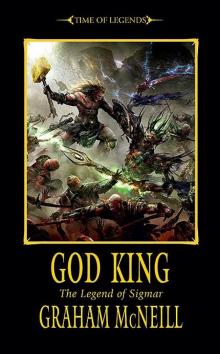 03 - God King
03 - God King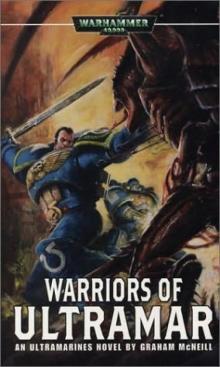 Warhammer - Ultramarines 02 - Warriors Of Ultramar (McNeill, Graham)
Warhammer - Ultramarines 02 - Warriors Of Ultramar (McNeill, Graham)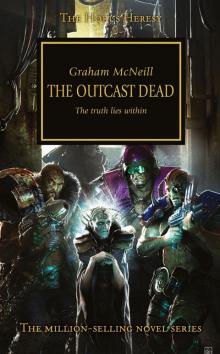 The Outcast Dead
The Outcast Dead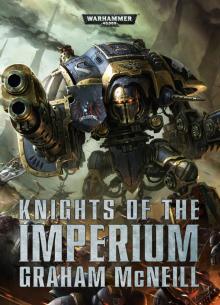 Knights of the Imperium
Knights of the Imperium Defenders of Ulthuan
Defenders of Ulthuan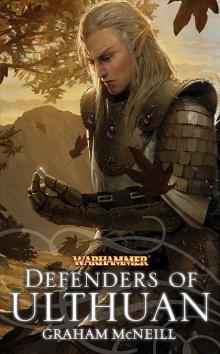 01 - Defenders of Ulthuan
01 - Defenders of Ulthuan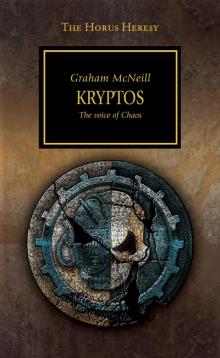 Kryptos
Kryptos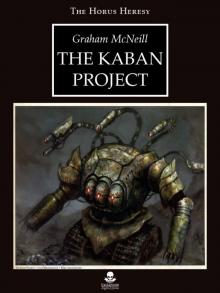 The Kaban Project
The Kaban Project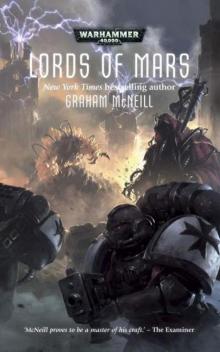 Lords of Mars
Lords of Mars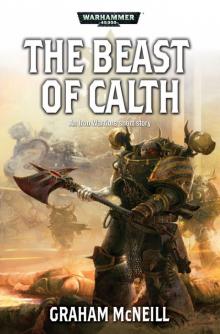 The Beast of Calth
The Beast of Calth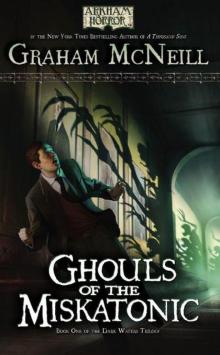 Ghouls of the Miskatonic (The Dark Waters Trilogy)
Ghouls of the Miskatonic (The Dark Waters Trilogy)![[Sigmar 01] - Heldenhammer Read online](http://i1.bookreadfree.com/i/03/24/[sigmar_01]_-_heldenhammer_preview.jpg) [Sigmar 01] - Heldenhammer
[Sigmar 01] - Heldenhammer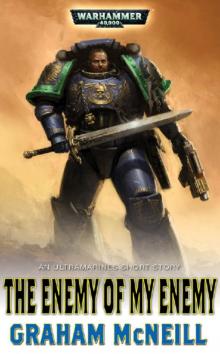 The Enemy Of My Enemy
The Enemy Of My Enemy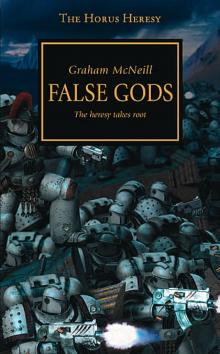 False Gods
False Gods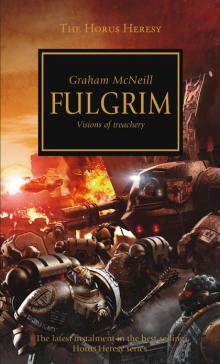 Fulgrim
Fulgrim Mechanicum whh-9
Mechanicum whh-9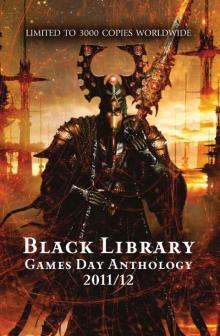 Death of a Silversmith
Death of a Silversmith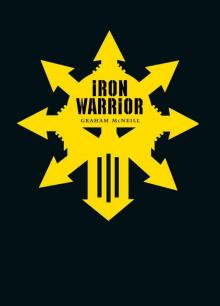 Iron Warrior
Iron Warrior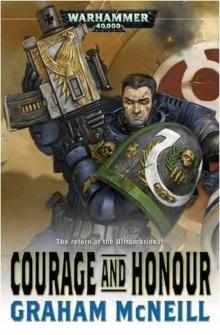 Courage and Honour w4u-5
Courage and Honour w4u-5![[Ultramarines 6] Chapters Due - Graham McNeill Read online](http://i1.bookreadfree.com/i1/03/30/[ultramarines_6]_chapters_due_-_graham_mcneill_preview.jpg) [Ultramarines 6] Chapters Due - Graham McNeill
[Ultramarines 6] Chapters Due - Graham McNeill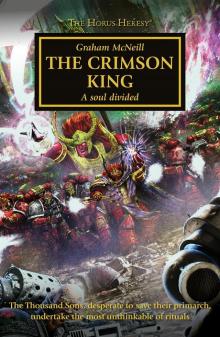 The Crimson King
The Crimson King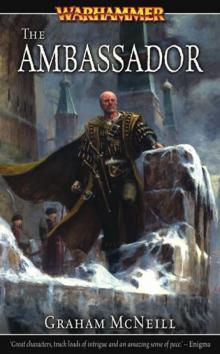 1 the ambassador
1 the ambassador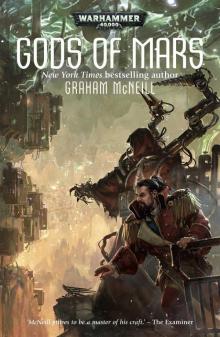 Gods of Mars
Gods of Mars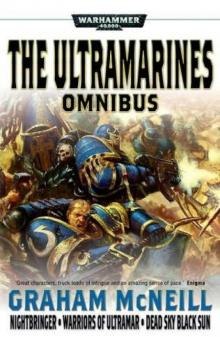 Ultramarines Omnibus (warhammer 40000: ultramarines)
Ultramarines Omnibus (warhammer 40000: ultramarines)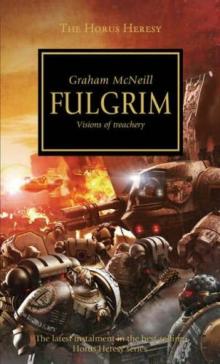 Fulgrim: Visions of Treachery whh-5
Fulgrim: Visions of Treachery whh-5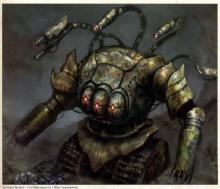 The Kaban Project (warhammer 40000: horus heresy)
The Kaban Project (warhammer 40000: horus heresy)![[Sigmar 02] - Empire Read online](http://i1.bookreadfree.com/i1/04/05/[sigmar_02]_-_empire_preview.jpg) [Sigmar 02] - Empire
[Sigmar 02] - Empire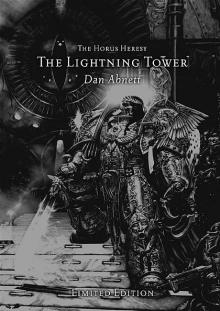 The Lightning Tower & The Dark King
The Lightning Tower & The Dark King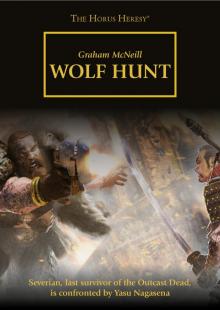 Wolf Hunt
Wolf Hunt Killing Ground w4u-4
Killing Ground w4u-4![Warhammer - [The Ambassador Chronicles 02] - Ursun's Teeth Read online](http://i1.bookreadfree.com/i1/04/05/warhammer_-_[the_ambassador_chronicles_02]_-_ursuns_teeth_preview.jpg) Warhammer - [The Ambassador Chronicles 02] - Ursun's Teeth
Warhammer - [The Ambassador Chronicles 02] - Ursun's Teeth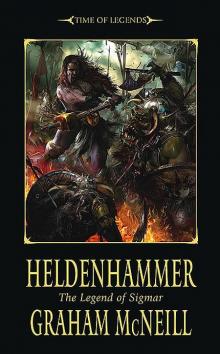 01 - Heldenhammer
01 - Heldenhammer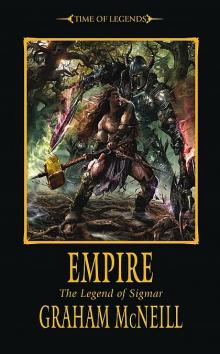 02 - Empire
02 - Empire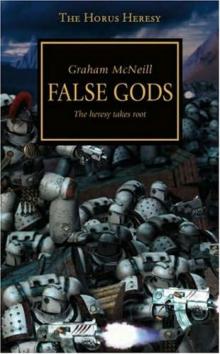 False Gods whh-2
False Gods whh-2